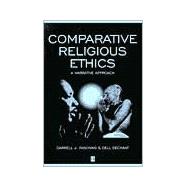
Darrell J. Fasching is Professor of Religious Studies at the University of South Florida where he has previously served as Associate Dean of the College of Arts and Sciences, and as Chair of the Department of Religious Studies. He is the author of Narrative Theology After Auschwitz: From Alienation to Ethics (1992), The Ethical Challenge of Auschwitz and Hiroshima (1993) and The Coming of the Millennium (1996).
Dell deChant is Instructor and Director of Undergraduate Studies in Religious Studies at the University of South Florida where he has taught since 1996. He is the Editor of the Journal of the Society for the Study of Metaphysical Religions.
| Preface | viii | ||||
| Acknowledgments | ix | ||||
| PART I POST/MODERN STORIES OF WAR AND PEACE | 1 | (72) | |||
|
3 | (7) | |||
|
10 | (32) | |||
|
10 | (11) | |||
|
21 | (9) | |||
|
30 | (8) | |||
|
38 | (3) | |||
|
41 | (1) | |||
|
41 | (1) | |||
|
42 | (31) | |||
|
43 | (3) | |||
|
46 | (6) | |||
|
52 | (4) | |||
|
56 | (8) | |||
|
64 | (6) | |||
|
70 | (1) | |||
|
71 | (2) | |||
| PART II WAR AND PEACE: ANCIENT STORIES AND POST/MODERN LIFE STORIES | 73 | (192) | |||
|
75 | (9) | |||
|
84 | (20) | |||
|
85 | (6) | |||
|
91 | (2) | |||
|
93 | (5) | |||
|
98 | (4) | |||
|
102 | (1) | |||
|
103 | (1) | |||
|
104 | (31) | |||
|
105 | (5) | |||
|
110 | (6) | |||
|
116 | (12) | |||
|
128 | (5) | |||
|
133 | (1) | |||
|
133 | (2) | |||
|
135 | (30) | |||
|
136 | (8) | |||
|
144 | (8) | |||
|
152 | (9) | |||
|
161 | (2) | |||
|
163 | (1) | |||
|
164 | (1) | |||
|
165 | (32) | |||
|
166 | (8) | |||
|
174 | (11) | |||
|
185 | (6) | |||
|
191 | (3) | |||
|
194 | (1) | |||
|
195 | (2) | |||
|
197 | (30) | |||
|
198 | (7) | |||
|
205 | (6) | |||
|
211 | (11) | |||
|
222 | (3) | |||
|
225 | (1) | |||
|
225 | (2) | |||
|
227 | (38) | |||
|
228 | (7) | |||
|
235 | (6) | |||
|
241 | (13) | |||
|
254 | (9) | |||
|
263 | (1) | |||
|
264 | (1) | |||
| PART III THE WAY OF ALL THE EARTH | 265 | (50) | |||
|
267 | (1) | |||
|
268 | (29) | |||
|
269 | (5) | |||
|
274 | (5) | |||
|
279 | (6) | |||
|
285 | (9) | |||
|
294 | (1) | |||
|
294 | (1) | |||
|
295 | (2) | |||
|
297 | (18) | |||
|
297 | (3) | |||
|
300 | (10) | |||
|
310 | (3) | |||
|
313 | (1) | |||
|
314 | (1) | |||
| Index of Subjects | 315 | (6) | |||
| Index of Names and Terms | 321 |
The New copy of this book will include any supplemental materials advertised. Please check the title of the book to determine if it should include any access cards, study guides, lab manuals, CDs, etc.
The Used, Rental and eBook copies of this book are not guaranteed to include any supplemental materials. Typically, only the book itself is included. This is true even if the title states it includes any access cards, study guides, lab manuals, CDs, etc.